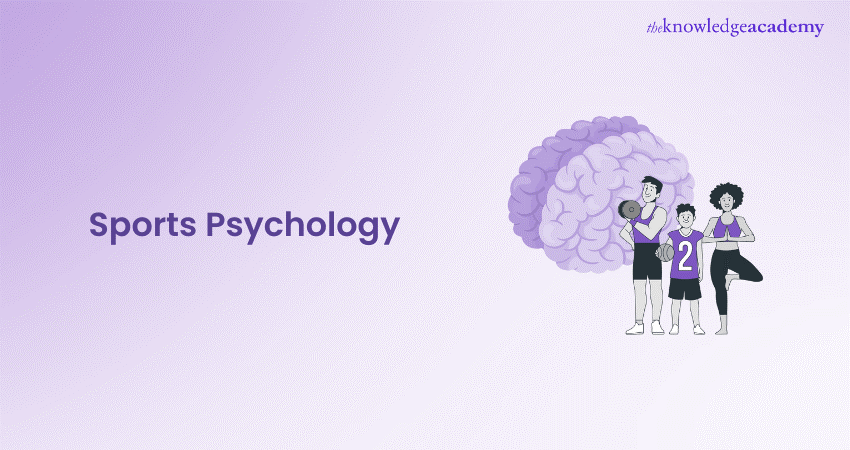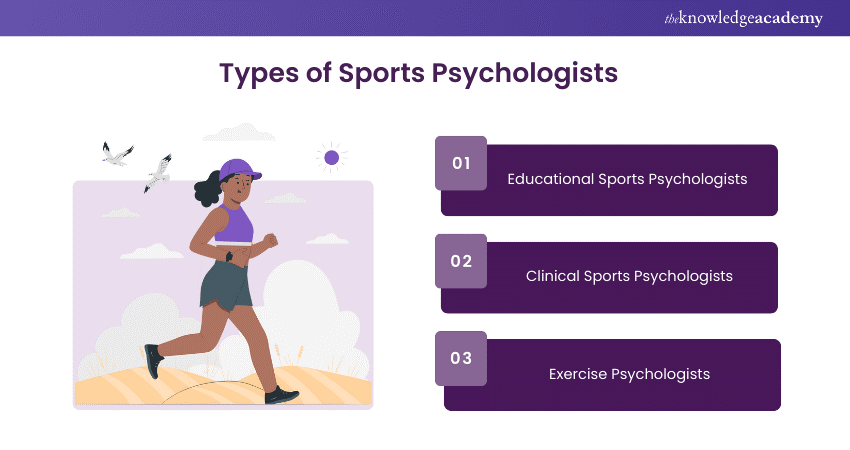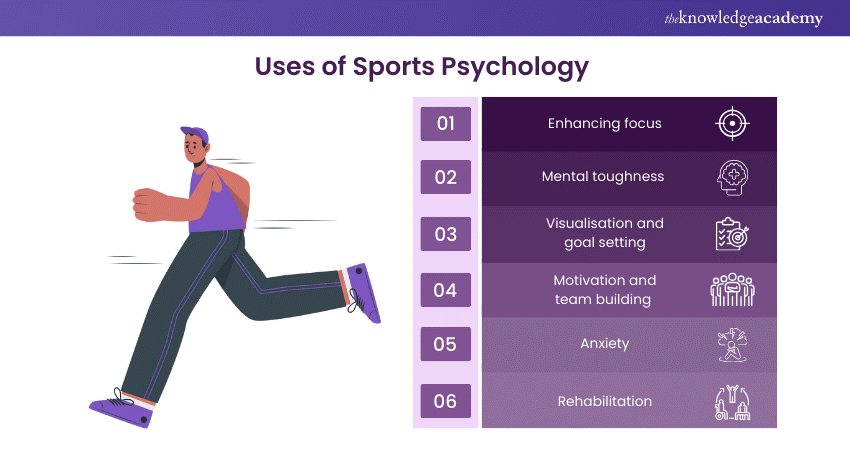We may not have the course you’re looking for. If you enquire or give us a call on 01344 203999 and speak to our training experts, we may still be able to help with your training requirements.
Training Outcomes Within Your Budget!
We ensure quality, budget-alignment, and timely delivery by our expert instructors.

Being an athlete isn’t just about the glory and medals; it’s a tough gig! Imagine dealing with intense competition, the high hopes of fans, and the constant need to stay fit. It’s enough to make anyone’s nerves jittery. But, hey, that’s where the superhero of sports comes in – Sports Psychology!
Think of Sports Psychology as the coach for your mind. It’s all about keeping your head in the game, literally. It tackles all the mental hurdles – from stress to wobbly self-confidence – that can trip up even the best athletes. So, if you’re dreaming of being the go-to person for athletes looking to sharpen their mental game, you’re in luck! This blog is your all-access pass to becoming a champion’s champion.
Table of Contents
1) What is Sports Psychology?
2) Types of Sports Psychologists
3) Commonly used techniques in Sports Psychology
4) Uses of Sports Psychology
5) Career in Sport Psychology
6) Conclusion
What is Sports Psychology?
Sports Psychology is the scientific study of the psychological processes and factors influencing sports and physical activity participation. It includes motivation, confidence, focus, and stress and provides direction for improving performance and well-being.
Sports Psychologists play a crucial role in helping athletes manage pressure, focus, and anxiety to achieve their goals. This field also delves into the dynamics of interpersonal relationships, interactions, and decision-making in sports settings. As a discipline, Sports Psychology strives to enhance mental processes and physical fitness, leading to improved performance and satisfaction in sports.
Types of Sports Psychologists
Different athletes have different Sports Psychology needs and different ways to access them. Let's have a detailed view of the different types of Sports Psychologists that cater to their needs:

Educational Sports Psychologists
Educational Sports Psychologists focus on teaching mental skills to enhance athletic performance. They consult with athletes and coaches on implementing elements like visualisation, goals, and other relaxation methods.
These objectives can enhance concentration, assertiveness, and enthusiasm to aid athletes in optimal performance. Such specialists may organise seminars and training sessions, where they demonstrate practical techniques that sportspersons might apply in their daily practice.
Clinical Sports Psychologists
A Clinical Sports Psychologist deals with Mental Health matters concerning exercise and sports. They involve themselves with athletes who have anxiety, depression, eating disorders, substance use disorders, and other disorders.
Clinical Sports Psychologists engage in the practice by offering therapy and counselling to help athletes deal with their psychological well-being, competition stress and psychological injuries. Their work plays a significant role in ensuring that the athletes have sound minds and healthy bodies.
Exercise Psychologists
Sports and Exercise Psychologists focus on the psychological effects of exercise and encourage people to exercise for their psychological well-being. They must determine and help their clients design exercise regimes that improve mood, decrease stress, and increase general quality of life.
Exercise Psychologists also study the role of psychological variables in exercise compliance and encouragement. They advocate for a healthy and active lifestyle and use exercise to enhance Mental Health and quality of life.
Aid in creating a safe space for everyone around you with our Mindfulness Training - sign up now!
Commonly used techniques in Sports Psychology
These are some of the most common methods used in Sports Psychology to help athletes:
Goal setting
Goal-setting strategy is one of the key concepts utilised in Sports Psychology. It refers to setting specific, tangible, and reachable goals to facilitate an athlete's training and competition. It is often preferable to divide goals into short-term and long-term, with the latter being most effective when they are Measurable, Achievable, Realistic, Significant, and time-bound.
Success in goal setting enables athletes to stay motivated to achieve the intended goals, mark off progress on every step, and find purpose.
Self-talk
Cognitive (verbal) intervention, a way of thinking almost like talking to oneself, focuses on self-talk. Affirmations make the individual more positive, concentrated, and inspired, while impairment makes the individual less optimistic, less focused, and demotivated.
Psychologists in this field encourage athletes to identify and replace negative thoughts with positive and constructive messages, improving their mental status as they practice.
Progressive Muscle Relaxation
Progressive Muscle Relaxation (PMR) is a technique that focuses on tensing muscles and subsequent relaxation. Such practice minimises physical stress and anxiety, leading to tranquillity and general well-being. Athletes have used PMR to reduce nervousness before going on the field, enhance sleep, and heal quicker from training stress.
Hypnosis
In Sports Psychology, hypnosis increases attention, relaxation, and visualisation. In hypnosis, athletes can relax and enter a state of deep concentration, where positive commands can easily influence them. Hypnosis can enhance performance by instilling confidence, minimising worry, and sharpening concentration and visualisation.
Cognitive Behavioral Therapy (CBT)
Cognitive Behavioural Therapy (CBT) is a well-known psychological intervention that assists athletes in transforming their thinking and behaviour patterns into positive ones.
CBT is centred on the identification of stressors, anxiety, and performance pressure and the formulation of strategies for dealing with them. Besides challenging irrational thoughts and promoting positive cognitions, CBT improves mental/emotional health in athletes.
Learn how you can prevent psychological distress that can lead to extreme adversities - sign up for our Prevention Psychology Training now!
Uses of Sports Psychology
Let us now have a look at some of the uses of Sports Psychology:

Enhancing focus
Enhancing focus involves paying attention to specific stimuli and staying engaged during performance. Coaches use some strategies with Sports Psychologists' help to help athletes avoid distractions.
This is especially important in emotionally charged situations where staying on task and getting the job done may be difficult. Some of the ways that are employed to facilitate attention are the use of mindfulness, cue words, and the utilisation of routines.
Mental toughness
Mental toughness, on the other hand, deals with the quality and determination of an athlete when confronted with challenges. It includes aspects such as persistence, confidence, and working on feelings.
Cognitive/behavioural strategies that Sports Psychologists use include techniques such as affirmation, coping with stress, and setting goals. Sport psychology allows athletes to learn to cope with stress, remain focused, and consistently perform optimally.
Learn to manage stress mindfully and build resilience with our Handle Stress And Develop Your Resilience Training - register now!
Visualisation and goal setting
Visualisation and goal setting are critical strategies used in studying Sports Psychology. One technique is visualisation, which entails using the imagination to build mental pictures of the performance. This is said to boost confidence and motor skills.
Similarly, goal setting provides a strategic blueprint for success, detailing the objectives and milestones to be achieved. Sports Psychologists assist athletes in formulating SMART goals—specific, measurable, achievable, relevant, and time-bound—and employ creative methods to gear up for competitive events.
Motivation and team building
Motivation is essential for an athlete’s commitment to training and competitions. Some Sports Psychologists' roles include finding motivation factors, including internal and external factors, to keep the athletes motivated and enthusiastic.
They also focus on cooperation activities to improve inter- and intra-personal relations within the group. Team building enhances the team's working capacity, enhances team spirit, and develops fellowship.
Anxiety
Reducing anxiety is a crucial part of Sports Psychology. Performance pressure is a common issue for athletes, and it decreases their performance.
Some of the methods used by Sports Psychologists to address anxiety include deep breathing, progressive muscle relaxation, and cognitive restructuring. These methods help athletes handle stress and attain a composed demeanour during competitions.
Rehabilitation
Sports Psychology is crucial in treating injured athletes, and counselling is, therefore, necessary in handling the psychological aspects of injury and healing. Rehabilitation Psychologists assist clients in managing expectations, staying positive, and developing short-term achievable goals during the rehabilitation period.
Imagery, relaxation, and mental skills training are taught to enhance healing and increase the likelihood of athletes returning to sport.
Career in Sport Psychology
Sport Psychology provides a wide range of opportunities in various workplaces, which makes it possible for specialists to work in different fields. Here are some key career opportunities in the field:
Professional sports teams
Sports Psychologists employed by organised teams offer psychological preparation and services to players. Coaches help individuals acquire cognitive procedures that improve performance, cope with stress, and sustain attention. These people are usually part of the team’s coaching staff and help the sportspersons prepare psychologically for a game.
College and high school sports
For example, the Sports Psychologist helps students balance school and sporting activities in college and high school. Services include mental skill development, consulting on anxiety and motivation, and time management. They ensure that young players have a healthy mental perspective necessary for success in football and other life activities.
Private practice
Consultation and mental skills training by Sports Psychologists in private practice are specific and available to athletes at different levels. They collaborate with individual athletes to diagnose and solve performance concerns, increase mental strength, and establish a course of action. They may also organise training sessions for teams and organisations that need the services of a private practitioner.
Research and academia
Those who wish to focus on the theoretical aspect of Sports Psychology can work as researchers or teach in academic institutions. They teach and conduct research in universities and research institutes investigating facets of Sports Psychology, including psychological factors influencing performance, rehabilitation from injuries, or effects of exercise on psychological well-being. They also carry out teaching responsibilities by offering courses, supervising students and producing scholarly works.
Conclusion
A career in Sports Psychology is like being a backstage hero for athletes. You get to wear many hats – from being a personal cheerleader to a wise strategist. You could be the one-on-one coach helping athletes hurdle over mental blocks or the brainy researcher uncovering new ways to boost performance. And it’s not just about sports; the skills of a Sports Psychologist can also be a game-changer in business or education.
Frequently Asked Questions

It helps them cope with any mental health concerns that may hinder their training and performance in the short and long run.

Mental health plays a big role in healing as injuries also inflict trauma, Sports Psychology is a great way to get through injury rehabilitation.

The Knowledge Academy takes global learning to new heights, offering over 30,000 online courses across 490+ locations in 220 countries. This expansive reach ensures accessibility and convenience for learners worldwide.
Alongside our diverse Online Course Catalogue, encompassing 17 major categories, we go the extra mile by providing a plethora of free educational Online Resources like News updates, Blogs, videos, webinars, and interview questions. Tailoring learning experiences further, professionals can maximise value with customisable Course Bundles of TKA.

The Knowledge Academy’s Knowledge Pass, a prepaid voucher, adds another layer of flexibility, allowing course bookings over a 12-month period. Join us on a journey where education knows no bounds.

The Knowledge Academy offers various Health & Safety Courses, including Advance First-Aid Training, Active and Healthy Lifestyle Training, and Counselling Certifications. These courses cater to different skill levels, providing comprehensive insights into What is Yoga.
Our Health & Safety Blogs cover a range of topics related to Psychology, offering valuable resources, best practices, and industry insights. Whether you are a beginner or looking to advance your Psychology Skills, The Knowledge Academy's diverse courses and informative blogs have you covered.
Upcoming Health & Safety Resources Batches & Dates
Date
 Anxiety Courses
Anxiety Courses
Fri 24th Jan 2025
Fri 21st Mar 2025
Fri 2nd May 2025
Fri 27th Jun 2025
Fri 3rd Oct 2025
Fri 5th Dec 2025







 Top Rated Course
Top Rated Course



 If you wish to make any changes to your course, please
If you wish to make any changes to your course, please


